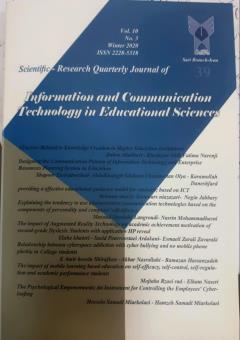Systematic review of robotics research in the field of education: lessons from the past and future directions
Subject Areas : Infomartion Technology
1 - Instructor, Payam Noor University, Department of Humanities, Faculty of Educational Sciences, Aderbayjan
Keywords: Robotics training, creativity, learning, systematic review, bibliography.,
Abstract :
Robotics in the field of education has attracted the attention of scholars as a valuable tool in the direction of flourishing and cultivating cognitive/social skills in support of learning in the field of education. The aim of the current research is to identify the main topic clusters, conceptual developments and key players and the state of knowledge in this field. The research method in the present research is applied in terms of objective and quantitative in terms of research methodology, and it was done by systematic review method. The statistical population of the research is 248 patients after screening. VOSviewer software was used for analysis. Based on the findings of the research, the main areas of study are: educational robots, educational technology and the development of computational thinking, studies that deal with the effects of educational robots on students and exceptional students, interactive environment, efficiency, achievement, knowledge and program. Education is focused. In terms of time evolution, research findings showed that research priorities and topics have evolved over time, and key concepts such as learning, creativity, and the effects of educational robots have been repeated over time. In the field of inter-organizational cooperation, the findings of his research showed that the level of these cooperations is very low, and the study area in question has scattered literature, which is more influenced by the scientific literature of America and Spain. In summarizing the findings of the research, it can be mentioned that this field of study has grown rapidly in recent years and it seems that in the coming years and with the development of new technologies in the field of robotics, it will be more and more interested in educational sciences and other disciplines. Strings should be placed.
References
Amriani A, Alham F, Aji AF, Utomo AY, Junus KM. An empirical study of gamification impact on e-Learning environment. Paper presented in the 3rd International Conference on Computer Science and Network Technology, ICCSNT. Dalian, China; 2014.
Barker, B. S., & Ansorge, J. (2007). Robotics as means to increase achievement scores in an informal learning environment. Journal of research on technology in education, 39(3), 229-243.
Bascou, N. A. & Menekse, M. (2016). Robotics in K-12 formal and informal learning environments: A review of literature. Paper presented at the 2016 ASEE Annual Conference & Exposition, New Orleans, Louisiana.
Bouvier, S., & Connors, K. (2011). Increasing student interest in science, technology, engineering, and math (STEM). America: Massachusetts Department of Higher Education publication.
Burgo Bencomo, O. B., León González, J. L., Cáceres Mesa, M. L., Pérez Maya, C. J., & Espinoza Freire, E. E. (2019). Algunas reflexiones sobre investigación e intervención educativa. Revista Cubana de Medicina Militar, 48.
Buitrago Flórez, F., Casallas, R., Hernández, M., Reyes, A., Restrepo, S., & Danies, G. (2017). Changing a generation’s way of thinking: Teaching computational thinking through programming. Review of Educational Research, 87(4), 834-860.
Conchinha, C., Silva, S. G., & Freitas, J. C. (2015). La robótica educativa en contexto inclusivo. Ubicuo social: Aprendizage con TIC.
Chang, C. W., Lee, J. H., Chao, P. Y., Wang, C. Y., & Chen, G. D. (2010). Exploring the possibility of using humanoid robots as instructional tools for teaching a second language in primary school. Educational Technology & Society, 13(2), 13-24.
Damaševičius, R., Maskeliūnas, R., & Blažauskas, T. (2018). Faster pedagogical framework for steam education based on educational robotics. International Journal of Engineering and Technology, 7(2.28), 138-142.
Domínguez, A., & Stipcich, M. S. (2018). Trabajo colaborativo y TIC para ayudar a un estudiante con TDA* a aprender física. Revista de enseñanza de la física, 30(1), 53-61
Funk, M., Cascalho, J., Santos, A. I., Pedro, F., Medeiros, P., Amaral, B., & Mendes, A. (2022). A simple interactive robot to promote computational thinking. Frontiers in Computer Science, 4, 1-13.
Frangou, S., Papanikolaou, K., Aravecchia, L., Montel, L., Ionita, S., Arlegui, J., Pina, A., Menegatti, E., Moro, M., Fava, N., Monfalcon, S., & Pagello, I. (2008). Representative examples of implementing educational robotics in school based on the constructivist approach. Conference on simulation modeling and programing for autonomous robots Venice (Italy) (pp. 54–65)
Fülöp, M. T., Udvaros, J., Gubán, Á., & Sándor, Á. (2022). Development of computational thinking using microcontrollers integrated into OOP (Object-Oriented Programming). Sustainability, 14(12), 7218.
Han, J., Jo, M., Jones, J., & Jo, J. H. (2008). Comparative study on the educational use of home robots for children. Journal of Information Processing Systems, 4(4), 159–168.
Karami, M., Rajaei, M., & Naamkhaah, M. (2014). Investigation of tendency toward critical thinking in secondary school teacher and its role on their teaching style. Research In Curriculum Planning, 11(13), 34–47. [In Persian]. http://jsr-e.khuisf.ac.ir/article_534314_en.html. Accessed 15 December 2017
Lough, T., & Fett, C. (2002). Robotics education: Teacher observations of the effect on student attitudes and learning. The Magazine of Design & Technology Education. https://www.researchgate.net/publication/266661041. Accessed 11 July 2019.
Pozzi, M., Prattichizzo, D., & Malvezzi, M. (2021). Accessible educational resources for teaching and learning robotics. Robotics, 10(1), 38.
Roosta F, Taghiyareh F, Mosharra, M. Personalization of gamification-elements in an e-learning environment based on learners' motivation. Paper presented in 8th International Symposium on Telecommunications, IST 2016. Tehran, Iran; 2017.
Urias MDV, Chust AC, Carrasco OL. How to gamify an online technical subject in higher education. In L.G. Chova, A.L. Martinez, and I.C. Torres (Eds.). In Proc. of Edulearn16: 8th International Conference on Education and New Learning Technologies (pp. 7071-708). Barcelona, Spain; 2016.
Santos, I., Grebogy, E. C., & Medeiros, L. F. D. (2019). Crab robot: a comparative study regarding the use of robotics in STEM education. In Smart Learning with Educational Robotics (pp. 183-198). Springer, Cham.
Yanış, H., & Yürük, N. (2020). Development, validity, and reliability of an educational robotics based technological pedagogical content knowledge self-efficacy scale. Journal of Research on Technology in Education, 53(4), 375-403.


